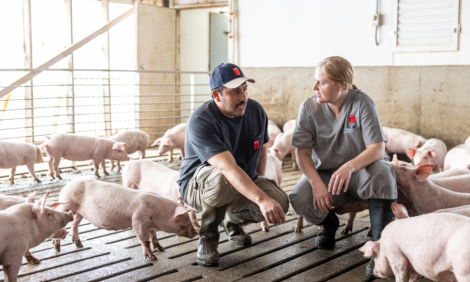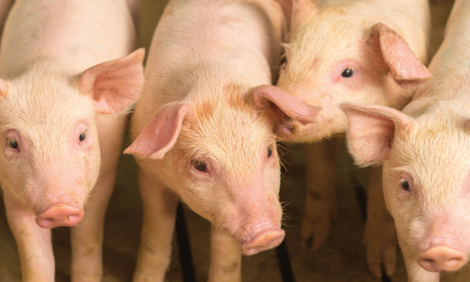



Enhancement of Litter Size in Commercial Swine
A biological product used in a study at the Prairie Swine Centre shows potential to stimulate litter size in commercial swine.
Summary
Prenatal mortality is a significant concern in commercial swine. Mechanisms for this loss are not clearly defined but previous research linked poor blood supply to the developing fetuses as a leading cause.
The author conducted a trial utilising biologic derived from bacteria and assessed its effects on overall litter size and postnatal health in swine.
Introduction
Prenatal mortality is a prime concern in the North American Pork Industry; 20 to 30 per cent of embryos are lost between gestation days 15 and 30 and another 10 to 15 per cent between gestation days 50 and 70.
For more than 10 years, efforts to improve litter size in commercial meat pigs by identification and selective breeding for genes responsible for uterine capacity and placental efficiency have had limited success. Studies of improved diet balance or vitamin supplements also failed. Hence, the need remains to understand critical steps controlling porcine conceptus-endometrial interactions important for foetal survival.
Previous work supported by Ontario Pork showed that endometrial lymphocytes regulate and contribute to the new blood vessel development at sites containing healthy fetuses but abruptly stop blood vessel promoting growth factor production and elevate inflammation supporting cytokines at the sites containing growth arrested fetuses. This identified endometrial lymphocytes and their products as suitable targets for therapeutic or selective breeding strategies to enhance production. Immunomodulatory molecules compatible with human food production are commercially available. These could be safely used to mildly stimulate production of uterine cytokines and blood vessel promoting factors, which may elevate foetal survival and increased litter size.
Prairie Swine Centre used one such product, a biologic prepared from bacteria by a Canadian Biopharmaceutical company; Bioniche Life Sciences, Inc. A trial was conducted to determine whether this biologic could promote litter size in commercial swine by administering it at the time of insemination. The preliminary results are very promising and are discussed below.
Results and Discussion
A biologic from Bioniche Life Sciences, Inc was administered in sows at the time of insemination and its effects were evaluated on litter size and overall postnatal growth.
Results from that trial indicated that litter size was increased by around two piglets in treated group compared with control. This increase in litter size at birth did not negatively affect piglet weight or overall health. Larger litters were weaned from treated sows than from the controls, without affecting piglet weight or health parameters.
Further, it was demonstrated that piglets born to treated sows took a similar number of days to attain market weight as piglets born to control sows. There were no differences in the meat parameters between pigs born to treated sows versus control.
Conclusion
The results clearly demonstrate that the biologic used in the present study has significant potential to stimulate litter size in commercial swine.
Due to intellectual property matters, no details on the biologic or specifics of the treatment can be published at this time, added the author.
Acknowledgements
This research work was supported by Ontario Pork, Bioniche Life Sciences, Inc, Natural Sciences and Engineering Research Council and Ontario Ministry of Agriculture and Food. The author would like to thank staff at the Arkell Swine Research Station, University of Guelph for animal care and management.
September 2013






